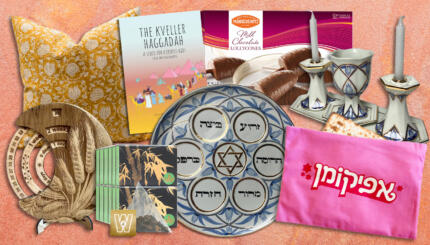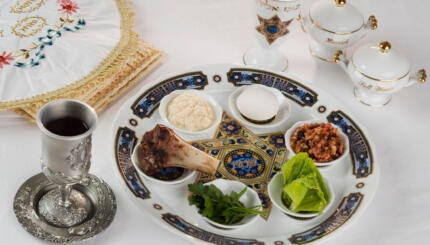Reprinted with permission of the author.
For the parents of squirmy kids, a Passover seder can feel longer than the 40 years our ancestors spent wandering the desert. Fortunately, it’s perfectly possible to prevent the fifth question (are we done yet?) and the eleventh plague (restless natives) from showing up at our Pesach celebrations this year.
Taking into account that every family has different comfort levels, objectives and degrees of observance, here are some tips toward creating a fun and meaningful Passover seder that promises to captivate the interest of all kinds of kids–wise, wicked, simple and just plain unable to ask.
That’s the Ticket
 Prior to the big night, make “matzah tickets” out of index cards. Award the tickets to children throughout the Seder for reciting the Ma Nishtana, answering tricky Passover trivia questions, helping little brothers and sisters make Hillel sandwiches and oodles of other desirable seder behaviors. At the end of the evening let ticket-holders redeem their winnings for Passover related prizes (i.e. stickers, candies, plastic frogs).
Prior to the big night, make “matzah tickets” out of index cards. Award the tickets to children throughout the Seder for reciting the Ma Nishtana, answering tricky Passover trivia questions, helping little brothers and sisters make Hillel sandwiches and oodles of other desirable seder behaviors. At the end of the evening let ticket-holders redeem their winnings for Passover related prizes (i.e. stickers, candies, plastic frogs).
With your help, My Jewish Learning can provide endless opportunities for learning, connection and discovery.
Keep the Karpas Coming
Grumpy kids and hungry tummies go hand in hand. A steady flow of karpas (a.k.a. carrots and celery) and kosher for Passover salad dressing for double dipping, will keep your kids happily crunching away until it’s time for the main course.
Give out Goody Bags
Keep your junior seder participants happy and occupied with special plague goody bags. While you can purchase already prepared “bags of plagues” at Judaica stores and online for around $12 a piece, you can accomplish the same thing at the dollar store for a fraction of the price. Try plastic sunglasses for darkness, toy frogs, wild beasts and insects (lice and vermin); kosher for Passover marshmallows for hail, red dot stickers for boils; and band-aids for blood.
Don’t Passover the Books
Visit a library or bookstore and stock up on Passover themed books. Scatter them around the table for children to peruse during the longest stretches of the Seder. A few surefire hits are: Shlemiel Crooks by Anna Olswanger, Wonders and Miracles by Eric Kimmel and Uncle Eli’s Passover Haggadah by Eliezer Segal.
Have an Afikomen Search Party
It’s always the same story at my house: The big cousins find the afikomen and the little cousins get upset; the little cousins get a prize anyway and the big cousins get upset. By making the afikomen hunt a team effort rather than a competition, we can do away with such griping. Use post-it notes to lead the search party from one destination to the next (i.e. “Go to the place where Elijah will enter,” or “Pharaoh had frogs jumping in his bed,” see if there are any jumping in yours”). The clues should ultimately lead the pack to the illusive dessert of honor. Be prepared with inexpensive “afikomen finder” rewards for the whole crew.
Take Plague Breaks
Help kids stay focused and fidget-free during long seders by periodically letting them get their wiggles out. Should your children’s attention start to stray from the task at hand, call for a “plague break” and instruct all antsy guests to jump like frogs or run in place like wild beasts.
Have a Matzah Match
Before the Seder, write matched pairs of Passover words on index cards. For example, write “Hillel” on one card and “sandwich” on another; “ten” on one card and “plagues” on another. Keep going – four/questions; matzah/ball; Elijah’s/cup–until you have enough cards to secretly stash one under every guest’s plate. Sometime before dinner, tell everyone to lift their plates, look at the card and track down their matching half. (Hint: For children too young to read–or to understand the match mentality–cut cards in half using varying puzzle cuts and write one word on each half. When kids find a card that “fits” theirs, they’ll know they’ve found their match).
Put a Spotlight on Stories
The true purpose of the seder is to pass down the Passover story from generation to generation, but why stop there? Ask a few of your senior guests to come prepared to share stories about seders past. When kids get antsy, pass a play microphone to a family patriarch or matriarch and let the storytelling begin.
Perform a Little Elijah Magic
Give little skeptics something to think about by making Elijah’s wine magically disappear. Secretly place some super absorbent polyacrylamide crystals (sold in gardening or craft stores as Aqua Crystals or Hydro Gel) in the bottom of an opaque Elijah cup. Just before you welcome the prophet, let your children see you fill the cup with “wine” (a.k.a. water with kosher for Passover food coloring). By the time you finish singing “Eliyahu Ha Navi” the liquid will be solidified. That’s when you turn the cup upside-down and reveal–tada–Elijah drank every last drop! (Hint: A pre-seder practice round will help ensure a successful liquid/crystal ratio.)
Keep An Eye On the Big Picture
Sure, planning a kid-friendly seder is liable to take more work than simply bribing our kids to behave with a pound of chocolate-covered macaroons, or locking them in the playroom with a babysitter for the night. But we’ll know our efforts have been well worth our while when our fidgety children one day do the same for our fidgety grandchildren.
afikomen
Pronounced: ah-fee-KOH-men, Origin: Greek, a piece of matzah that is hidden during the Passover seder, found after dinner and eaten as dessert at the end of the meal.
kosher
Pronounced: KOH-sher, Origin: Hebrew, adhering to kashrut, the traditional Jewish dietary laws.
Pesach
Pronounced: PAY-sakh, also PEH-sakh. Origin: Hebrew, the holiday of Passover.
seder
Pronounced: SAY-der, Origin: Hebrew, literally "order"; usually used to describe the ceremonial meal and telling of the Passover story on the first two nights of Passover. (In Israel, Jews have a seder only on the first night of Passover.)


